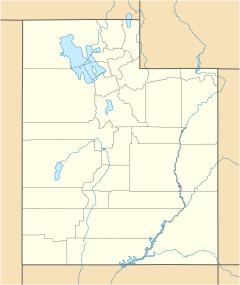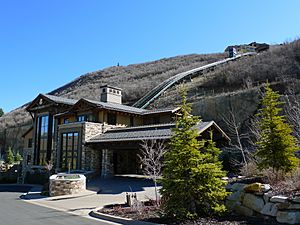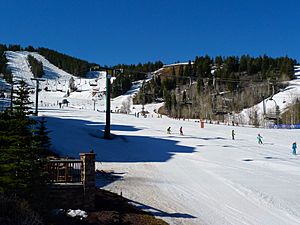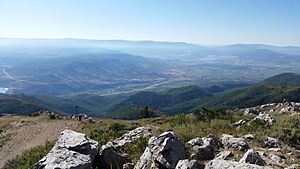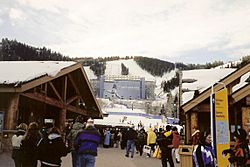Deer Valley facts for kids
Quick facts for kids Deer Valley |
|
|---|---|
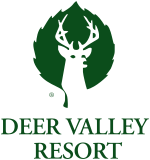 |
|
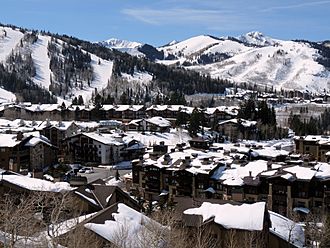
Overview of a portion of the resort's Flagstaff Mountain terrain
|
|
| Location | Wasatch Range Summit County, Utah |
| Nearest city | Park City, Utah |
| Coordinates | 40°37′22″N 111°29′22″W / 40.62278°N 111.48944°W |
| Vertical | 3,000 ft (910 m) |
| Top elevation | 9,570 ft (2,920 m) |
| Base elevation | 6,570 ft (2,000 m) |
| Skiable area | 2,026 acres (820 ha) |
| Runs | 103 |
| Longest run | 2.8 mi (4.5 km) |
| Lift system | 24 - 1 Gondola - 12 High-speed quad chairlifts - 5 Triple chairlifts - 2 Double chairlifts - 4 Magic carpets |
| Lift capacity | 50,470 skiers/hr |
| Terrain parks | No |
| Snowfall | Base: <150 inches (380 cm) Peak: 294 inches (750 cm) |
| Snowmaking | Yes, over 660 acres (270 ha) |
| Night skiing | No |
| Website | Deer Valley |
Deer Valley is a special ski resort in Utah, United States. It's about 36 miles east of Salt Lake City, in a town called Park City, Utah. This resort is only for skiers, so snowboarders are not allowed here.
Deer Valley was a host for the 2002 Winter Olympics. It held events like freestyle moguls, aerials, and alpine slalom. The resort is also expected to host the mogul event for the 2034 Winter Olympics. Deer Valley often hosts big competitions for the International Ski Federation.
Contents
About Deer Valley Resort
Deer Valley is a unique place because it's only for skiers. It focuses on offering fancy places to stay and great services. Many skiers love Deer Valley because it's one of only three resorts in the United States that is ski-only.
History of the Ski Area
How the Mountain Was Developed
Skiing started at Deer Valley way back in the 1930s. The first ski trails were built in 1936–1937. The very first ski lifts were put in place in 1946 by local people. This early ski area was called the Snow Park Ski Area.
In 1981, Edgar Stern started the Deer Valley Resort in the same spot. Since then, it has grown a lot. Today, it includes six mountains with six bowls. It also has 930 acres of glade skiing (skiing through trees) and 670 acres of snow-making. The whole resort covers 2,026 acres.
New Areas and Upgrades
In 2007, Deer Valley added a new area called Lady Morgan Peak. This added 200 acres of new trails and gladed terrain. A new fast chairlift was also built there.
In 2012, another fast chairlift, the Mountaineer Express, was added to Little Baldy Peak. This made it easier to get around the mountain.
In September 2023, the resort shared exciting news. It announced that the Mayflower ski area, which is right next to Deer Valley, would become part of the resort.
Big Ski Competitions
The 2002 Olympic Winter Games
During the 2002 Winter Olympics, Deer Valley was a very important place. It hosted the freestyle moguls and aerials events. It also held the men's and women's alpine slalom races.
Three trails on Bald Eagle Mountain were used for the games. These included Champion for moguls, Know You Don't for alpine slalom, and White Owl for aerials. Huge temporary stadiums were built at the end of each run. These stadiums were 12 stories tall and could hold 10,000 people. Many more people could watch from standing areas along the courses. In total, about 13,300 fans could watch each event. Almost all tickets were sold, with 96,980 spectators watching the competitions. Even during the Olympics, 95 percent of Deer Valley stayed open for regular skiing.
World Cup Events
Deer Valley has also hosted the FIS Freestyle World Ski Championships twice, in 2003 and 2011. It was the first American place to host these championships more than once. It also hosted the men's and women's moguls and aerials events in 2019.
The resort is a regular host for FIS World Cup events. It has hosted mogul and aerial competitions every year since 2000, except for 2003 and 2004. Deer Valley has become known as a "Mecca for freestyle skiing events" because it hosts so many of them.
Why Snowboarding is Not Allowed
Deer Valley is one of only three ski resorts in the United States that does not allow snowboarders. The other two are Alta and Mad River Glen. Since it opened in 1981, snowboarding has never been permitted here.
Sometimes, snowboarders have protested this rule. For example, in 2007, a snowboard company offered money for videos of people snowboarding at these resorts. They said this rule was unfair.
Weather and Skiing Areas
Deer Valley has a climate with big temperature changes. Summers are warm or hot, and winters are cold. This type of weather is called a humid continental climate.
The ski slopes face different directions. About 45% of the terrain faces north, and 45% faces east. Only 2% faces south, and 8% faces west. This mix helps keep the snow good on different parts of the mountain.
Chairlifts at Deer Valley
Deer Valley has many different chairlifts to take skiers up the mountains. Here are some of them:
| Name | Year Opened | Manufacturer | Lift type | Length | Location |
|---|---|---|---|---|---|
| Aurora | 2024 | Doppelmayr | Fixed-Grip Quad | 199m | Keetley Point |
| Burns Express | 2022 | Doppelmayr | Detachable Quad | 311m | Bald Eagle Mountain |
| Carpenter Express | 1996 | Garaventa CTEC | Detachable Quad | 1474m | Bald Eagle Mountain |
| Crown Point | 1990 | Yan | Fixed-Grip Triple | 425m | Bald Eagle Mountain |
| Empire Express | 1998 | Garaventa CTEC | Detachable Quad | 1471m | Empire Canyon |
| Homestake Express | 2018 | Doppelmayr | Detachable Quad | 521m | Bald Eagle Mountain |
| Hoodoo Express | 2024 | Doppelmayr | Detachable Quad | 321m | Keetley Point |
| Jordanelle Express Gondola | 1998 | Garaventa CTEC | Four-Person Gondola | 1576m | Little Baldy Peak |
| Judge | 2004 | Doppelmayr | Fixed-Grip Triple | 212m | Flagstaff Mountain |
| Keetley Express | 2024 | Doppelmayr | Detachable Six-Pack | 2034m | Keetley Point |
| Lady Morgan Express | 2007 | Doppelmayr | Detachable Quad | 835m | Lady Morgan Peak |
| Mayflower | 1984 | Yan | Fixed-Grip Triple | 1065m | Bald Mountain |
| Mountaineer Express | 2012 | Doppelmayr | Detachable Quad | 904m | Little Baldy Peak |
| Northside Express | 1993 | Garaventa CTEC | Detachable Quad | 1138m | Flagstaff Mountain |
| Quincy Express | 2001 | Garaventa CTEC | Detachable Quad | 1263m | Flagstaff Mountain |
| Red Cloud | 1990 | Yan | Fixed-Grip Triple | 783m | Flagstaff Mountain |
| Ruby Express | 2002 | Garaventa CTEC | Detachable Quad | 727m | Flagstaff Mountain |
| Silver Lake Express | 1999 | Garaventa CTEC | Detachable Quad | 2015m | Bald Eagle Mountain |
| Silver Strike Express | 2004 | Doppelmayr | Detachable Quad | 1559m | Flagstaff Mountain |
| Snowflake | 1993 | CTEC | Fixed-Grip Double | 334m | Bald Eagle Mountain |
| Sterling Express | 2006 | Doppelmayr | Detachable Quad | 1428m | Bald Mountain |
| Sultan Express | 2005 | Doppelmayr | Detachable Quad | 1522m | Bald Mountain |
| Viking | 1990 | Yan | Fixed-Grip Triple | 181m | Flagstaff Mountain |
| Wasatch Express | 1996 | Garaventa CTEC | Detachable Quad | 1280m | Bald Mountain |
 | Charles R. Drew |
 | Benjamin Banneker |
 | Jane C. Wright |
 | Roger Arliner Young |


